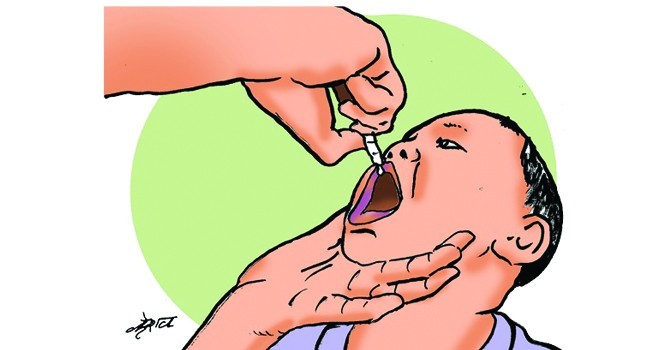Immunisation against rotavirus to prevent diarrhoeal infection among children

By Ajita Rijal
Kathmandu, Dec. 22: Rotavirus infection is the most common cause of severe diarrhoea in young children, during wet monsoons or dry winter and cold season, and vaccine against it would help stop the spread of the disease, according to doctors.
Vaccine against Rota virus is needed to help fight against various diseases to keep children safe from infection causing diarrhoea.
The government is planning to administer Rota virus vaccine, named Rotarix, as a part of immunisation programme from mid-June/July 2020 to lower the morbidity and mortality rate of children below five years.
According to doctors, children under five years of age have less resistance to fight infections which may even put their lives in danger and thus there is an utmost need to take necessary precautions.
According to Dr. Jhalak Sharma Gautam of the Children Health and Vaccination Section Chief under the Family Welfare Division “vaccination means strengthening their immune capacity to fight diseases” and thus children need to be vaccinated.
Dr. Gautam said that a new plan is being introduced on the basis of diseases, and accordingly the vaccines for Rota Virus will be provided for free.
‘There are more than 25 vaccines, but not all need to be administered, though they are provided in foreign countries. For us, we need to analyse Nepal’s’ context and its capacity and identify the necessary vaccines,” he added. The government has so far been providing 11 vaccines free of cost. After the inclusion of Rota virus vaccines in immunisation programme, the total number of vaccines provided free will be 12, he informed.
“Once a free vaccine programmed begins, it will have to be free forever, so we are planning it to start from the mid-June next year” he said.
Rotavirus causes severe watery diarrhoea, vomiting, fever and abdominal pain in children. When the children are exposed to cold they are more vulnerable to the Rota viral infection, said Dr. Jyoti Ratna Dhakhwa, a pediatrician.
According to doctors, rotavirus causes gastroenteritis, an inflammation of the stomach and intestines. It mainly infects the small intestine, destroying the surface tissue preventing the absorption of nutrients leading to diarrhoea. Symptoms can range from mild, watery diarrhea to severe ones accompanied by vomiting and fever.
Rota virus vaccine helps the body produce immunity (protection) to prevent infection with rotavirus or to lessen the severity of an infection. Like any vaccine, it may not fully protect your child from rotavirus, and it will not help if your child already has the virus.
According to Dr. Dhakhwa up to 35 per cent of the diarrheal cases are caused by rotavirus, which can be prevented through vaccination.
Diarrhoea is one of the most common illnesses among children and continues to be major cause of children morbidity and mortality in Nepal. The government aims to administered Rota vaccines in 6, 20,000 children. “The vaccine will be administered to the children in two doses. The first dose of the vaccine will be provided when a child is six-month old and the next dose when she/he is ten month old,” said Gautam.
The Global Alliance for Vaccines and Immunizations (GAVI) is providing the necessary vaccines against the Rota virus in Nepal.
“With the aim of reaching every child, in the Comprehensive multiyear plan for immunisation under National Immunisation Programme, we have planned to introduce vaccine against typhoid and Human Papillovirus (HPV) in near future,” said Dr. Gautam.
There are 16,000 vaccine centres across the nation and the government has planned to expand it to 45,000 centres, he added.
Recent News

Do not make expressions casting dout on election: EC
14 Apr, 2022
CM Bhatta says may New Year 2079 BS inspire positive thinking
14 Apr, 2022
Three new cases, 44 recoveries in 24 hours
14 Apr, 2022
689 climbers of 84 teams so far acquire permits for climbing various peaks this spring season
14 Apr, 2022
How the rising cost of living crisis is impacting Nepal
14 Apr, 2022
US military confirms an interstellar meteor collided with Earth
14 Apr, 2022
Valneva Covid vaccine approved for use in UK
14 Apr, 2022
Chair Prachanda highlights need of unity among Maoist, Communist forces
14 Apr, 2022
Ranbir Kapoor and Alia Bhatt: Bollywood toasts star couple on wedding
14 Apr, 2022
President Bhandari confers decorations (Photo Feature)
14 Apr, 2022











